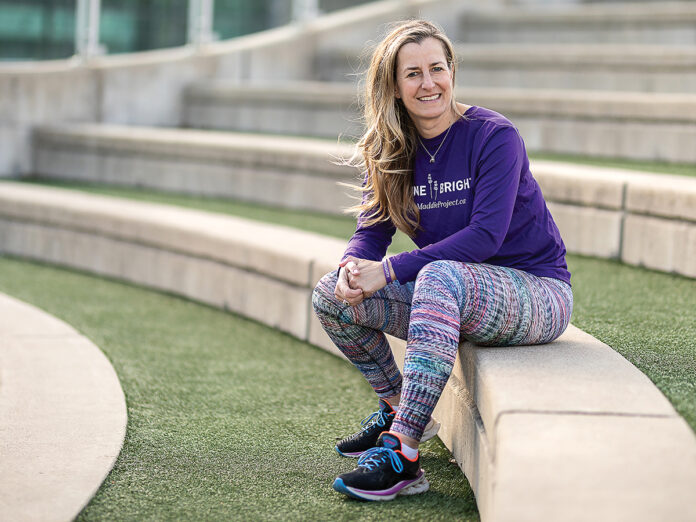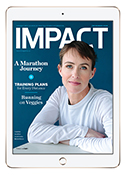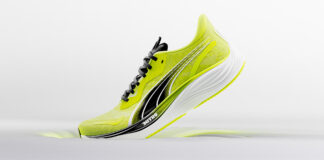
When Nicole German joins the crowd of runners at the Toronto Scotiabank Waterfront Marathon, she notices a few others wearing purple T-shirts. On their backs, she sees “Shine Bright,” a carbon copy of the message on her own purple T-shirt.
Running events are typically a solo endeavour, but for supporters of the grassroots non-profit The Maddie Project, there’s a little dose of magic in wearing those purple shirts. “You might run by a complete stranger,” says German, who founded the group in 2015, “but they’re wearing a purple shirt, so you create these connections.”
The shirts also serve as an important memory of German’s daughter, Madeline (Maddie) Grace German Coulter. “Anytime I see the colour purple, it reminds me of Madeline,” she says. The teen’s bright personality could light up a room. Her depression came on gradually and she died in 2015. She was 14 years old.
Between 10 and 20 per cent of Canadian youth will be affected by a mental illness or disorder, the Mental Health Commission of Canada estimates, but just one in five kids who require access to mental health services will receive them. Furthermore, suicide is a leading cause of death in 15 – 24-year olds in Canada and is second only to accidents. German’s The Maddie Project works to eliminate the stigma of youth mental illness by sparking conversations and providing funding to programs so youth and their families have uninhibited access to support and resources. Even as Madeline was undergoing her own treatment at North York General Hospital, she would comment about how when she was done, she wanted to raise money to create a better environment for patients just like her.
The grassroots non-profit has used many strategies to fundraise since its start in 2015. German says they’ve done theatre productions, bake sales, even fashion shows to raise money and awareness. Recently, they took part in the Goggins Challenge, a virtual running event that sees participants run four miles every four hours for 48 hours. They raised $110,000. They also participate every fall in the Scotiabank Toronto Waterfront Marathon, dating back to 2015.
Just five months after Madeline’s passing, volunteers suited up in the iconic purple shirts with their “Shine Bright” logos. That year, more than 170 people took part, tackling running and walking courses ranging from 5 km to a full marathon and raising about $150,000. Over the years, the Maddie Project has raised close to $3 million, with approximately $500,000 coming from the marathon.
With Maddie’s wish in the back of her mind, German and The Maddie Project set their sights on another space: the 1.2 acres around Phillips House. The North York General Hospital facility houses child and adolescent outpatient mental health programs as well as an impressive garden, named Maddie’s Healing Garden in honour of Madeline. “By moving mental health care out of a traditional hospital setting, Phillips House is changing the way we care for our community, giving vulnerable patients access to the right mental health care services when they’re needed most,” says Dr. Joshua Tepper, former president and CEO of North York General Hospital.
The patient space and gardens, which opened in September 2019, bloom with aromatic aster, forget-me-nots, and lavender. Not only will Phillips House and the gardens be a legacy for Madeline, says German, they will be a place for kids to experience nature and get out of the sterile hospital environment during treatment. “It’s really like a residential setting for them to feel at ease with the programming they’re doing, but also to be in a very positive environment,” she says.
German hopes to continue honouring Madeline’s legacy by supporting programs and organizations that work to help support young people and their families going through mental health challenges. She’s also hopeful that we can continue to reduce the stigma around simply speaking about mental health. “When somebody is struggling, they may not open up and they may not talk about it because it’s almost like an invisible illness,” she says. “Just by sparking conversations, we’re making change, we’re helping.”
Lead image by Denise Militzer
Read this story in the digital edition of IMPACT Magazine.
IMPACT Magazine’s 2021 Running Issue
Looking for running inspiration? Training for a race? We have first-rate training programs designed by some of the best running coaches for your next 10K, Half-Marathon, Marathon and 70.3 distances, plus an epic Road Running Shoe Review to help you get started on the right foot. Plus – our annual RACE SOURCE GUIDE features hundreds of races that you can participate in from virtual to in-person.
















